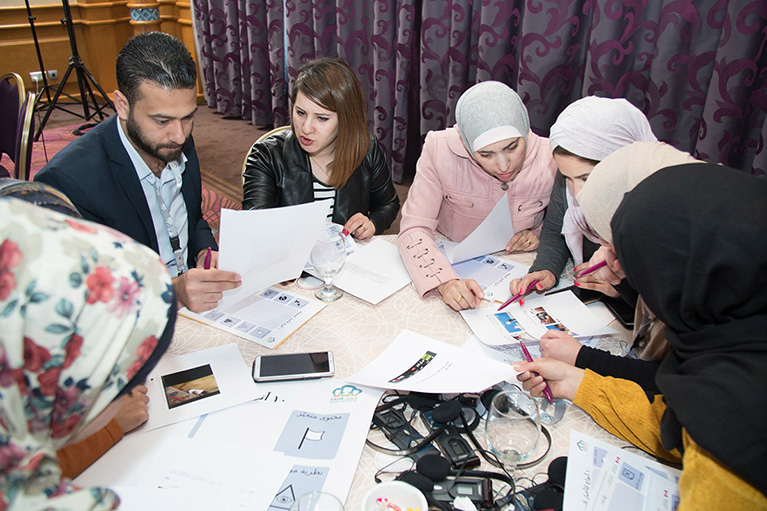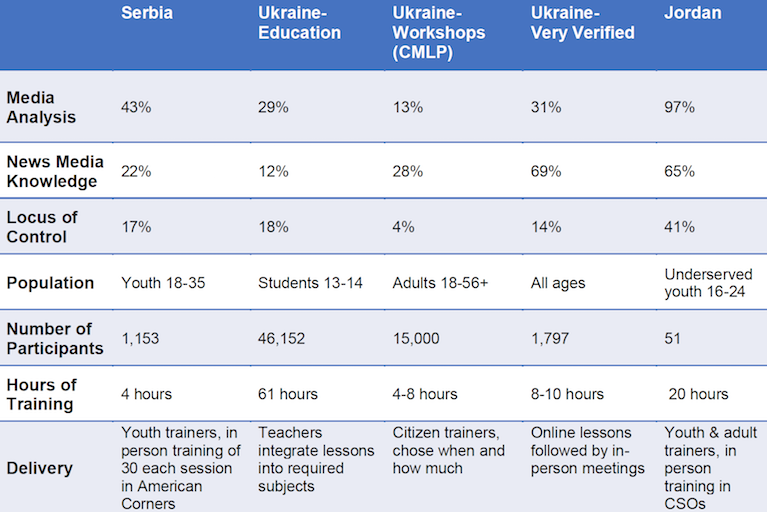Studies show pioneering media literacy approach can build citizen resistance to the COVID-19 “infodemic"

A flood of false information about COVID-19 hampers efforts by governments and public health officials to provide life-saving prevention information to citizens. Such misinformation confuses people about the need to follow proven prevention techniques, such as handwashing and social distancing. In the absence of an effective vaccine, public health information is indispensable. It’s critical that citizens have the skills to distinguish credible health information from misinformation in order to protect themselves, their families, and society at large.
Learn to Discern (L2D) equips citizens with media literacy and critical thinking skills to discern fact from fiction, learn how to access and assess reliable sources of information, and take responsibility for calling out misinformation when they see it. Recent results from impact studies of L2D initiatives in a diverse set of countries—Serbia, Ukraine, and Jordan—show that imparting these skills increases the ability to detect false information, including misinformation about public health. In some cases, participants were nearly twice as good at analyzing misinformation about health topics after the training.
Groundbreaking results: Participants better at analyzing misleading information
To assess the effectiveness of L2D programs in each country, IREX conducted a skills assessment survey—an approach to evaluation that the founding editor of the Journal of Media Literacy Education called “groundbreaking.” The survey was administered before and after the trainings to measure whether participants could better detect and analyze misinformation; felt a sense of control over how they respond to media and information that they consume (“locus of control”); and increased their knowledge of the news industry and digital information systems.
In all countries and regardless of the delivery format (in-person workshops, online blended learning, or formal classroom instruction), participants scored significantly higher than the control group or pre-workshop assessment in each of the areas listed in the table below. In Serbia and Jordan, over 1,000 youth participated in L2D workshops conducted in person. In Ukraine, three separate L2D initiatives were carried out: L2D-Education reached 46,152 students in 8th and 9th grades who received classroom instruction that integrated various media literacy and critical thinking concepts; Very Verified reached 1,797 people in a course blending online course work with in-person discussions; and the Citizen Media Literacy Project (CMLP) reached 15,000 adults ages 18-56 through in-person training conducted in a variety of community settings, such as libraries.

Participants better at detecting & analyzing false health information
In Jordan, the survey assessment asked participants to analyze an article containing false public health information. Participants improved their ability to critically analyze the article by 97%. They correctly pointed out multiple shortcomings within the article, such as a headline promising a miraculous cure, emotionally charged language, and references to unnamed researchers or medical studies. This suggests that media literacy and critical thinking trainings can effectively make citizens more savvy consumers of public health information related to COVID-19 and other pandemics.
Here is an excerpt from the false news article used in the Jordan study (translated from Arabic):
A DRINK THAT COMPLETELY CURES DIABETES
If you suffer from diabetes or if one of your relatives suffers from this disease, know that the difficult times will end and suffering will not have a place in your life anymore. A recent scientific study has shown that cactus juice treats diabetes and helps increase the burn rate of carbohydrates and fats stored in the body. […] US researchers this week reviewed nine studies in which they explored the benefits of aloe vera for type 2 diabetes. The study showed that the aloe vera plant is very useful for strengthening teeth and gums, and helps to treat many skin diseases such as: cold sores, eczema, insect bites, wounds and scars, skin infections and burns.
Recommendations: Expand media literacy initiatives globally
Imparting critical thinking and media literacy skills significantly increases the ability of citizens to analyze misinformation, including on public health topics. Those interested in mitigating the spread of COVID-19 or preventing future pandemics should consider expanding these kinds of efforts to other geographies. To ensure sustainability and reach large numbers of people, critical thinking and media literacy tools and training should be integrated into a variety of institutions, such as libraries, schools, youth centers, and other community hubs.
To advance the research agenda on the effectiveness of media literacy and critical thinking for improving public health outcomes, additional research is needed to understand whether media literacy and critical thinking durably change behaviors and make citizens more likely to practice public health guidance given by credible experts.
Download fact sheet (PDF, 355 KB)